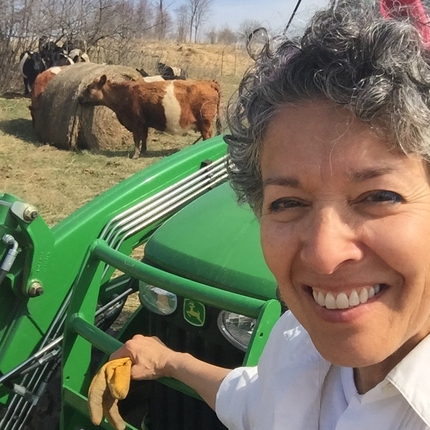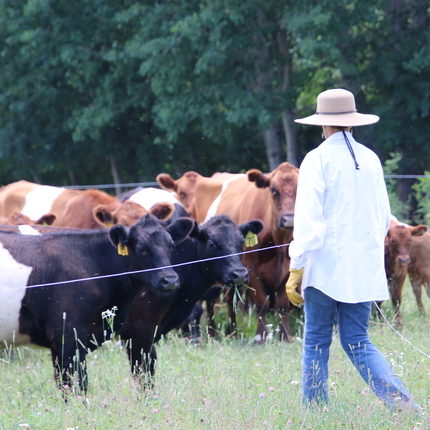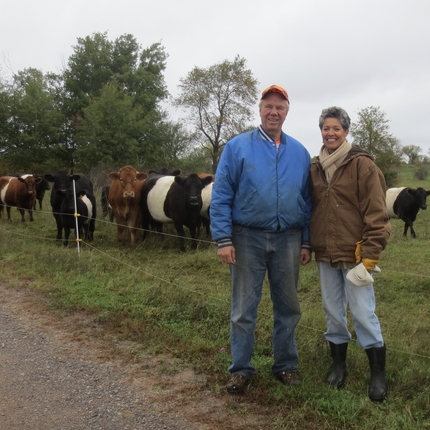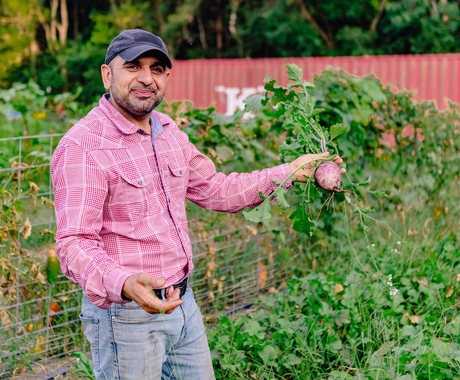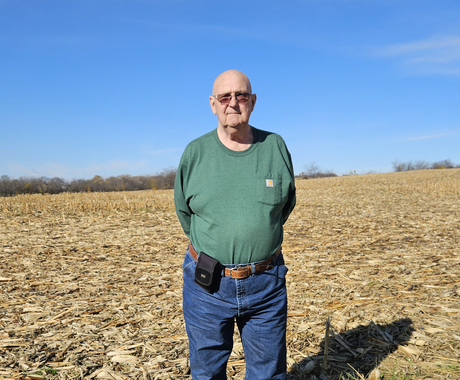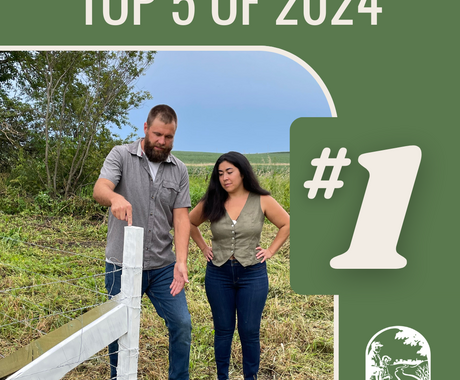At the age most farmers and producers retire, Sylvia Burgos Toftness and her husband, David, bought land and established their farm as a platform for conversation and education.
Since 2009, they have raised grass-fed beef and practiced medicinal permaculture on their farm. They advocate for and promote regenerative farming through on-farm programming and in several community leadership roles.
They welcome scores of visitors to their farm for pasture walks, baking classes, herb walks, and Cowgirl High Teas—opportunities to describe why sustainable practices are used and to answer visitors’ questions.
Because of her passion for the environment and teaching others how to use and protect what nature offers, Sylvia was nominated to receive the 2022 Environmental Leader Award, which honors accomplished leaders in the field of environmental stewardship and recognizes individuals with a proven track record and promise of future advancement in the field. The awards are an independent project administratively supported by the Center for Rural Affairs and made possible by the Walton Family Foundation.
Sylvia has spent years building up her knowledge and resources. After searching for land close to the community and church family they value, she and her husband bought their farm, Bull Brook Keep—72 rolling acres that sit between the small cities of Amery and Clear Lake, Wisconsin.
For the first few years, they continued their careers—Dave as a chiropractor and Sylvia as a public relations practitioner. Eventually, the farm became their full-time jobs.
Sylvia says it felt good to be able to retire from her corporate job nine years ago and devote more attention to the farm.
“The farm’s rocky acres are perfect for grazing—you wouldn’t want to ruin a plow by trying to push your way through that soil,” she said. “I bought our first small herd of Buelingo beef cattle just days after purchasing the farm. The five cows and one steer arrived on a cold day in early January and immediately made a beeline for the southern perimeter. Thank goodness the fences were good.”
Last year, the couple began planting medicinal trees and shrubs that work for their climate and soil, and they will harvest the bark, buds, flowers, leaves, berries, and roots. They have also used rotational grazing and feeding hay bales in their pastures to help improve tilth, especially on the dry ridges.
“I enjoy helping people see the value of land and water to their lives,” Sylvia said. “I do this through pasture walks, classes, shared meals, and my radio show, “Deep Roots Radio.” I believe it’s only when people see and feel a personal value that they are willing to take action.”
This year, Syliva and Dave made the difficult decision to phase out raising cattle due to their age. They still plan to farm, however.
“My pasture walks are morphing to guided herb walks called Herbal Safaris,” said Sylvia. “The purpose of these three-hour tours is to provide an opportunity for people to see the helpful plants not only growing on our farm, but which also grow in their own backyards and driveways. It’s about seeing the forest for the trees.”
Syliva didn’t always plan to have her own farm, but she’s always been passionate about her family’s traditions.
She was heavily influenced by her grandmother, Nana, in two ways: her cooking and her tending of a small garden on Staten Island.
“Nana was a terrific cook,” Sylvia said. “When she, her mother, and siblings transplanted themselves from Puerto Rico to New York City, Nana initially earned income by cooking and selling food to the families within her tenement and neighborhood. She’d buy fresh ingredients from the nearby Marqueta, and cook for crowds, and the food was delicious. I grew up in a large extended family, easily 30 to 40 relatives gathered for every and any celebration, and Nana was always at the stove, apron around her ample waist creating banquets of rice, beans, fresh pork, vegetables, salads, and fresh fish.”
Sylvia shadowed her grandmother as she tended her small garden at a summer bungalow on Staten Island, which was not much more than a tarpaper shack without indoor plumbing or television. And she was amazed by her grandmother’s ability to make nearly anything grow on the fire escape outside her Manhattan apartment window.
Her first encounters and knowledge of medicinal herbs also came from her grandmother, as well as her great-grandmother, Quela.
“They dosed me with soups and syrups when I was sick,” she said. “I recall having cloves of warmed garlic placed in my aching ears when I was very young.”
Later, when Sylvia moved from New York City to Duluth, Minnesota, for a TV reporting job, she was exposed to organic food.
“I was 23, living on my own for the first time, and I walked by a tiny food co-op, and ended up volunteering there,” she said. “I learned a very different way to buy and prepare food.”
When Sylvia married and moved to Minneapolis in 1981, her first garden was planted with the guidance of John Jeavons’ “How to Grow More Vegetables,” Rodale’s Organic Gardening magazine, and seeds acquired through her membership in the Seed Savers Exchange.
Her introduction to organic farming came in the late 1980s, when she volunteered to write the newsletter for the Organic Growers and Buyers Association. During this time, Sylvia visited organic operations covering hundreds and thousands of acres. She also had the opportunity to provide public relations support to farming organizations as they pushed for the Organic Foods Act in 1989 to 1990.
Sylvia learned about different plants, their names, and what they could be used for while walking through her grandmother’s garden. Many years later, while managing cattle every day, her eyes were opened to the wealth of native herbs in her own pastures.
“I knew echinacea was highly regarded, but I wondered about the dozens of others in the open fields, shaded fence lines, and boggy stream banks,” Sylvia said. “What was red clover good for? Blue vervain and yarrow? Tiny self-heal and tall boneset? Catnip, jewel weed, motherwort, and tiny violas? Plantain and bright dandelion? Was there good in stinging nettle? As in so much of my life, I read books to learn more. I’ve been studying herbs for about seven years now, and we want to continue transitioning some of our acreage to growing more medicinal shrubs and trees.”
This kind of thinking and action led to Sylvia winning the 2022 Environmental Leader Award, exemplifying why she and others like her are so vital to passing on knowledge about sustainable practices and how to use them in their own operations, and in their everyday lives.
“The award is a recognition I would never have imagined,” Syliva said. “I’m humbled, and I want to thank the Center for this honor.”

